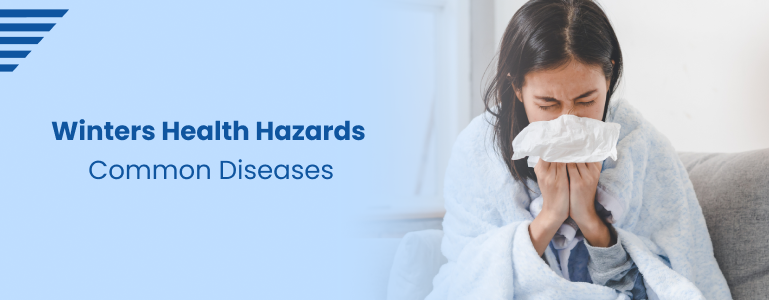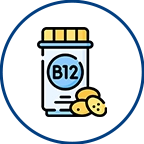Winter's Health Hazards: Common Diseases

Winter brings with it a magical blanket of snow and the joy of holiday festivities. However, it also ushers in a season of common diseases and health challenges that can dampen our spirits. In this blog post, we'll explore some of the most prevalent diseases that occur during the winter months and provide valuable tips on how to stay healthy and enjoy the season to the fullest.
Home Sample Collection
Influenza (Flu): The flu is perhaps the most notorious winter illness. It's highly contagious and can lead to severe symptoms like fever, body aches, and fatigue. Vaccination is the best defense against the flu, but maintaining good hygiene practices, such as regular handwashing, can also reduce the risk.
Common Cold: The common cold is aptly named, as it's one of the most frequently occurring illnesses in winter. Runny or stuffy nose, coughing, and sneezing are some symptoms. Wearing warm clothing, avoiding exposure to excessive cold, and maintaining a vitamin and mineral-rich, balanced diet are all effective ways to avoid catching a cold.
Seasonal Affective Disorder (SAD): SAD is a type of depression that typically shows up in the winter since there is less sunlight exposure. It may cause signs including mood swings, exhaustion, and trouble concentrating. Light treatment, consistent exercise, and spending time outside can all help you fight SAD.
Norovirus (Stomach Flu): Winter is also the season for norovirus outbreaks, often associated with gastroenteritis or stomach flu. This virus spreads quickly in crowded places and can lead to nausea, vomiting, and diarrhea. To protect yourself, practice good hygiene, especially when dining out or in public spaces.
Respiratory Infections: Winter's dry and cold air can irritate the respiratory tract, making individuals more susceptible to infections like bronchitis and pneumonia. Stay hydrated, avoid smoking, and dress warmly to reduce the risk of these respiratory illnesses.
Asthma Exacerbation: For individuals with asthma, winter can be a challenging time due to cold air and increased indoor allergens. Make sure to keep inhalers and medications handy, and consult with your healthcare provider for a winter asthma management plan.
Frostbite and Hypothermia: Extreme cold can lead to frostbite (skin and tissue freezing) and hypothermia (dangerously low body temperature). Dress in layers, cover exposed skin, and limit outdoor exposure during extreme cold to prevent these conditions.
Conclusion:
While winter may bring a host of common diseases and health challenges, it's possible to enjoy the season with proper precautions and a healthy lifestyle. Remember to get your flu shot, maintain good hygiene, keep warm, and consider investing in preventive measures to stay safe and healthy during the colder months. By taking these steps, you can make the most of winter's beauty without succumbing to its health hazards.
Frequently Asked Questions
What are the most common diseases that tend to occur during the winter season?
Some of the most common diseases in winter include influenza (flu), the common cold, seasonal affective disorder (SAD), norovirus (stomach flu), respiratory infections like bronchitis and pneumonia, and exacerbation of asthma symptoms.
How can I protect myself from getting the flu during winter?
The best way to protect yourself from the flu is to get a flu vaccine. Additionally,Avoid direct contact with sick people, wash your hands frequently, and adopt a healthy lifestyle that includes frequent exercise and a balanced diet.
What can I do to prevent catching a cold in winter?
To prevent catching a cold, dress warmly in cold weather, avoid prolonged exposure to extreme cold, and maintain good hygiene practices. In order to strengthen your immune system, make sure to eat a diet high in vitamins and minerals.
What are the symptoms of Seasonal Affective Disorder (SAD), and how can it be managed?
SAD symptoms include mood swings, fatigue, and difficulty concentrating. It can be managed by incorporating light therapy, regular exercise, spending time outdoors, and in some cases, consulting with a mental health professional for therapy or medication.
How can I reduce the risk of contracting norovirus (stomach flu) in winter?
To reduce the risk of norovirus, practice good hygiene, especially when dining out or in crowded places. Wash your hands thoroughly and avoid sharing utensils.Stay at home if you're unwell to stop the virus from spreading.
What precautions should I take to avoid respiratory infections like bronchitis and pneumonia during winter?
To avoid respiratory infections, stay hydrated, dress warmly, and limit exposure to extreme cold. Avoid smoking, and if you have a chronic respiratory condition like asthma, consult your healthcare provider for a winter management plan.
What are the symptoms of frostbite and hypothermia, and how can I prevent them during winter?
Frostbite symptoms include numbness and pale, firm, or blistered skin. Hypothermia symptoms include shivering, confusion, and slowed heart rate. To prevent these conditions, dress in layers, cover exposed skin, and limit outdoor exposure during extreme cold.
Is it safe to exercise outdoors during the winter months?
Yes, it's safe to exercise outdoors in winter, but take precautions. Dress in appropriate layers, wear moisture-wicking clothing, and protect exposed skin. Be aware of weather conditions, and if it's extremely cold or icy, consider indoor exercise alternatives.
Book Your Slot
Our Locations Near You in Hyderabad
3KM from Banjara Hills
1.9KM from Yusufguda
3KM from Madhura Nagar
5KM from Shaikpet
Profiles
- Cardiac Risk Profile
- Pituitary marker Profile
- Rheumatoid Arthritis Profile
- Dengue Fever Panel
- Lung Cancer Panel 1 Complete Molecular
- Gastroenteritis Screening Panel
- Thyroid Profile (T3,T4,TSH), Serum
- Pancreatic Marker Profile
- STD profile
- Androgen Profile
- Lipid Profile, Serum
- Pancreatic(acute)Profile
- PCOD Profile
Radiology
Pathology Tests
- Glucose Fasting (FBS),Sodium Fluoride Plasma
- Creatinine, Serum
- Glycosylated Hemoglobin (HbA1C)
- Vitamin B12 (Cyanocobalamin), Serum
- Thyroid Stimulating Hormone (TSH) Ultrasensitive, Serum
- Complete Urine Examination (CUE), Urine
- Liver Function Test (LFT),Serum
- Dengue (IgG & IgM), Serum
- Dengue Antigen (Ns1) Rapid, Serum
- C-Reactive Protein (CRP), Serum
- Widal (Slide Method), Serum
- Total IgE, Serum




